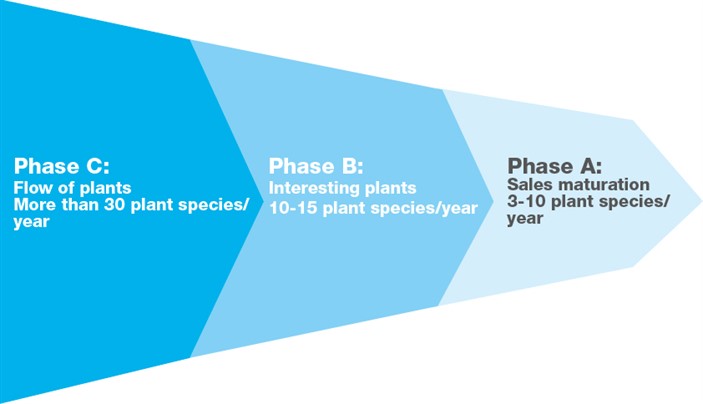New plants can either be completely new plants discovered in their natural surroundings or familiar plants with improved properties compared to earlier varieties.
We all dream of finding a completely new, unique plant - such as a blue Anubias - but it is equally important for us to produce and supply plants that offer the aquarist the greatest possible pleasure. And we continually do so by increasing our knowledge of plants by going on expeditions, performing tests, and maintaining contact with aquarists all over the world.
Three or four times a year, Tropica goes exploring for new plants - sometimes to exotic locations such as chalky, crystal-clear springs in South America, or murky, muddy ponds in Southeast Asia, and sometimes to extensive collections of aquatic plants, nurseries, and meetings with aquarists throughout the world. Every day, we receive inquiries about specific plants from aquarists. But they also show us plants that we can't recognise immediately, and this can also be an important source of news for us.
We have defined the characteristics that we consider most important in evaluating the suitability of plants for aquariums, and those of the greatest interest to aquarists, in our product development department. Practicability is one of the most important considerations, which primarily involves how easy the plant is to cultivate for the aquarist, options in the aquarium, and not least how well the plant stands up on its way from production to the aquarist. Recognisability is another important characteristic involving the plant's shape and/or colour. But specific plants must also differentiate themselves from the rest of the range - and not be just another Echinodorus with red spots. Suitability, uniformity, and stability in production are also necessary because it is little use if the plant can become really attractive in an aquarium if we are unable to produce and market it. Taken as a whole, we call these parameters the plant's news value. As an example we can mention Microsorum pteropus 'Windeløv', which almost all aquarists have and, not least, can recognise when they find it here and there. Pogostemon helferi is newer in aquariums, but is also a plant that many people recognise. It thrives under almost all conditions and adorns any aquarium.
New plants with the same news value as Microsorum pteropus 'Windeløv' and Pogostemon helferi are few and far between, but we make intensive efforts to produce similar new plants. We use a pipeline model (see figure below) for this purpose. The goal is to produce a number of new plants every year and, due to many years' experience, we know that only a small percentage of the plants that enter our pipeline can become new aquarium plants as such. Our pipeline is divided into three phases (A, B and C). Phase C is a major flow of plants - the goal is a hundred a year or more. During phase C we propagate the plants, try some out in aquariums containing other plants, and accumulate knowledge about them if they are already familiar aquarium plants. If we feel the plant is interesting, it goes on to phase B, during which it is tested under different physical and chemical conditions (e.g. light, CO2, nutrition, etc.), and we get help from test aquarists. Such plants are also propagated in our laboratory or in another way during phase B, and samples are tested in production. For a plant to go from phase B to phase A, it must meet all of our requirements regarding news value. Phase A is sales maturation - which is where we consider all the knowledge we have generated and turn it into information for distributors and aquarists. But this is also the phase where it is thumbs down to more than half of the plants that have reached this phase, usually due to a lack of suitability. We want to be certain that the plants that pass through the needle's eye and are presented on the market are plants that will delight aquarists.
We are already in contact with many hobbyists all over the world - but we have time and space for more. You are very welcome to send us an e-mail (tropica@tropica.dk) if you would like to help provide all of us aquarists with even greater pleasure.
